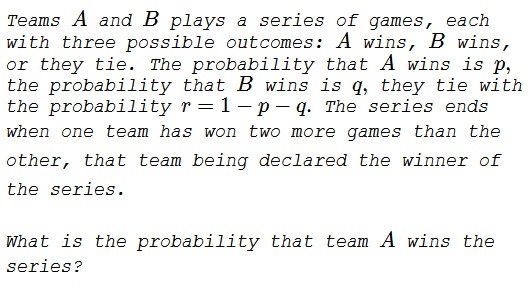In Praise of Odds
Problem

Solution setup 1
The tied games are of no consequence in determining the winner of the series and can be ignored. We know, that the odds of $A$ winning a game is $p:q$ so that a step towards $A$ winning a series has the probability of $\displaystyle p'=\frac{p}{p+q}.$ For $B$ the probability is $\displaystyle q'=\frac{q}{p+q}.$ Naturally, $p'+q'=1$ and $p':q'=p:q.$
Solution setup 2
Let $A$ denote the game won by $A,$ $B$ the game won by $B$ and $T$ the game that ended up tied. The latter are of no consequence in determining the winner of the series and can be ignored. Then the series might like the one below
$TATTBATBTTTBTTA \ldots$
We shall split the sequence into "consequential" pieces by grouping a won game with the preceding ties:
$(TA)(TTB)(A)(TB)(TTTB)(TTA) \ldots$
What matters at the end of the day is the last game in a group. The groups that end with $A$ contribute to the advancement of $A.$ These are:
$A, TA, TTA, TTTA, \ldots,$
each exclusive of any other. The corresponding probabilities are $p, rp, r^2p,\ldots$ that add up to
$\displaystyle p+rp+r^2p+\ldots = p\cdot\frac{1}{1-r}=\frac{p}{p+q}$
which we shall denote as $p'.$ $q'$ is defined similarly, $\displaystyle q'=\frac{q}{p+q}.$
Solution 1
Either way the problem reduces to a win/lose sequence with the probabilities $p'$ and $q'.$
The last two games in a series are bound to be won by the same team and the games beforehand come in pairs of wins (or losses) for both teams. Thus those pairs have the probability $p'q'+q'p'=2p'q'.$ A sequence of $n$ such pairs comes with the probability of $(2p'q')^n.$ It follows that $A$ wins a series of $2n+2$ games with the probability $(2p'q')^n(p')^2.$ The total probability of $A$ being declared a winner is
$\displaystyle\begin{align} P(A)&=\sum_{k=0}^{\infty}(2p'q')^n(p')^2=(p')^2\sum_{k=0}^{\infty}\frac{1}{1-2p'q'}\\ &=\frac{p^2}{(p+q)^2}\cdot\frac{(p+q)^2}{(p+q)^2-2pq}=\frac{p^2}{p^2+q^2}. \end{align}$
Solution 2
The last two games in a series are bound to be won by the same team and the games beforehand come in pairs of wins (or losses) for both teams. The odds of $A$ vs $B$ of winning two games in a row are $p^2:q^2.$ It follows that $A$ wins the series with the probability of $\displaystyle \frac{p^2}{p^2+q^2}.$
Acknowledgment
This is a slight modification of a problem from Chapter 12 of Ross Honsberger's Mathematical Delights (MAA, 2004). Honsberger refers to problem 1582(a) (The Mathematics Magazine) proposed by the Western Maryland College Problems Group and solved by the OSWEGO Problems Group (Solution 1).
|Contact| |Front page| |Contents| |Probability|
Copyright © 1996-2018 Alexander Bogomolny73779266
